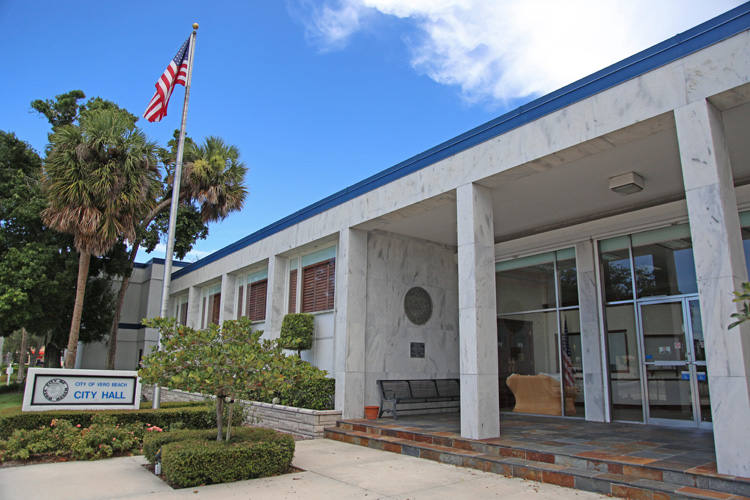
As homeowners receive their annual property-tax bills in the mail in the final days of October, residents within the Vero Beach city limits will notice their millage rate has gone up.
The Vero Beach City Council last month approved a tax increase to pay for adding four new police officers as well as increased staffing in the planning and finance departments, and a 5-percent pay raise for all 330-plus municipal employees.
“We passed a reasonable budget,” Mayor John Cotugno said after the council’s consecutive 4-1 votes on the millage rate and budget for fiscal year 2023-24, which began Oct. 1.
The lone dissenter in both votes was first-term council member and District 5 County Commission candidate Tracey Zudans, who said the newly adopted $33 million budget contained “unnecessary spending.”
She said the council could’ve “met the public-safety criteria without raising the millage,” which she added has now been increased in back-to-back years.
To fund the new budget, which increased 5.1 percent from $30.8 million last year and went into effect on Oct. 1, the council raised the city’s millage rate from $2.69 to $2.77 for every $1,000 of taxable value.
Under the new rate, the city tax for a house assessed at $400,000 would be slightly more than $1,100. Homeowners, though, also will feel the effects of higher property values, though Florida’s Save Our Homes law prevents homesteaded properties from increases of more than 3 percent annually.
Taxable real-property assessments in the city are up more than 12 percent this year, which will bring in $1.2 million in additional revenue without the increase in the tax rate.
The new millage rate is expected to generate more than $1.55 million in additional ad valorem tax revenue.
“I thought it was very important to take care of our employees, and we did,” City Manager Monte Falls said. “If you look back over the last five years and compare us to the county and Sheriff’s Office, you’ll see we were lagging behind in compensation.
“We don’t make products; we’re in the service business,” he added. “Our core mission is to serve people – to see to the health, safety and welfare of the community. Eighty percent of our budget is personnel. We needed to get those 5-percent raises.”
The raises were scheduled to be included in employees’ paychecks this week.
In addition, the Vero Beach Police Department now has the funding to add four sworn officers and one civilian employee, whose primary duty will be to review body-cam footage.
Each of the new full-time, sworn positions were designated for assignment: at the Vero Beach Regional Airport, in the downtown area, to the traffic unit, and as a utility officer to serve with the department’s marine division, beach patrol and bicycle unit.
In fact, Vero Beach Deputy Police Chief Matt Monaco said the agency recently made conditional job offers to three candidates for the sworn-officer positions, and he expects a fourth offer to be made soon.
“It takes time to review applications, conduct extensive background checks and do the medical examinations, but we’re well on our way to having these new officers on board,” Monaco said last week. “They should be hired in the next week or two.
“Then they have to go through our field officer training program, which can take another eight to 10 weeks before they’re ready to do the job,” he added. “But we’ve made significant headway.”
Monaco said the department already has re-assigned a full-time officer to the airport, where Breeze Airways continues to expand its commercial passenger service. That vacated position will be filled by one of the new hires.
The new budget also provides funding for two additional positions in the Finance Department and one in the noticeably overworked Planning Department. It also covers the recent hiring of Peter Polk, who is serving as the Three Corners project manager on a contract basis.
Cotugno said the 5-percent pay raise for city employees was “fair,” given these inflationary times, but the hiring of additional police officers was necessary.
“With all of the growth in the county and the considerable increase in traffic on our roads, we needed to step up our commitment to public safety,” he said. “More people are moving into the county, and they eventually find their way into the city.”
The new budget also allowed the city to “address quality-of-life issues that had been neglected,” Cotugno said, referring to “every-day housekeeping” and improving “basic infrastructure at local parks.”
One significant expenditure Cotugno noted was replacing the traffic signal at 14th Avenue and 21st Street – at a cost of $1.1 million.
“The impact of inflation is unbelievable,” Falls said. “It has impacted us as much as, or more, than every consumer in the marketplace.”
The new fiscal budget is the city’s first without an influx of cash from the sale of Vero Electric to Florida Power & Light in 2018. Since then, the city had been on a programmed “glide path” to wean itself off the more than $7 million in direct and administrative transfers used to balance its books.
Water-sewer rate hikes imposed in January, plus another round of increases this month, will bring in an additional $1.9 million this coming year. Utility customers will contribute $400,000 more into the city’s general fund than last year.
Total transfers from the water-sewer utility into the general fund are budgeted at more than $2.9 million.
“We’ve been able to maintain the fourth-lowest millage rate for a city of our size in Florida,” Cotugno said. “We also have the lowest millage rate of any full-service municipality on the Treasure Coast.”



